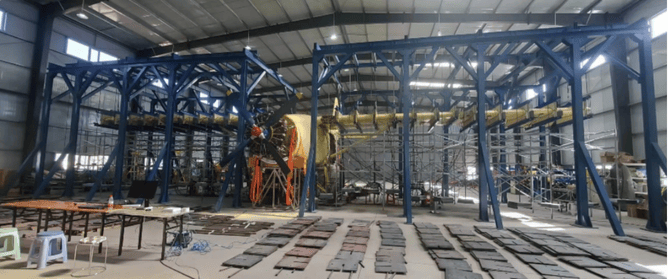Static Load Testing for Aircraft Fuselage & Wings
Project name: Static Load Testing for Aircraft Fuselage & Wings
April 2023 – An aviation university conducted static stress-strain testing on an aircraft fuselage and wing using 7 × SE-864U Static Stress-Strain Testing and Analysis Systems.
Test Setup & Methodology
Sensor Configuration
Strain gauges installed at critical structural points on the fuselage and wings.
Multi-axis measurement for bending, torsion, and shear stress analysis.
Loading Procedure
Incremental static loading applied via hydraulic actuators (0% → 150% limit load).
Strain data recorded at each load step (10% increments) to capture nonlinear deformation.
Data Acquisition
SE-864U system specifications:
24-bit ADC, ±5000με range
0.1με resolution for microstrain detection
Synchronized sampling at 1 kHz across all channels.
Key Technical Highlights
High-Density Strain Mapping
Over 200 measurement points to construct full-field stress distribution.
Detected stress concentration zones (e.g., wing-root joints, fuselage frames).
Real-Time Structural Integrity Monitoring
Yield point identification via strain deviation analysis (Δε/ΔF > 5% threshold).
Buckling by tracking compressive strain nonlinearity.
FEM Correlation
Test vs. simulation discrepancy <7% for 95% of measurement locations.
Validated composite skin panel load-path assumptions.
Test Outcomes
Load-path verification: Confirmed wing bending moment distribution matched design intent.
Design margin quantification: Identified 15% excess strength in primary fuselage frames.
Material property validation: Measured actual vs. nominal Young's modulus for AL-Li alloy components.
Conclusion
The static load test not only confirmed the structural integrity of the fuselage and wings under extreme load conditions but also validated FEM predictions with high accuracy. By mapping stress concentrations and identifying excess strength margins, this testing program provided essential data for certification and reinforced confidence in the aircraft’s design resilience for real-world operational demands.
This test provided critical empirical data for airframe static strength certification per CCAR-25.305.
Key Terms:
Limit load: Maximum expected service load (1× limit = 100% design load)
Microstrain (με): Strain unit (1με = 1×10⁻⁶ mm/mm)
FEM correlation: Finite Element Model validation against physical tests



